#the source is wiktionary
Text


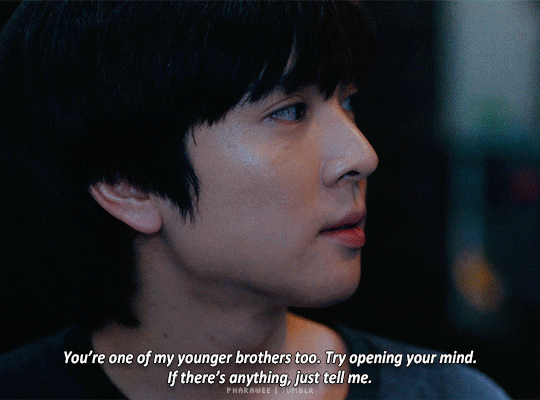
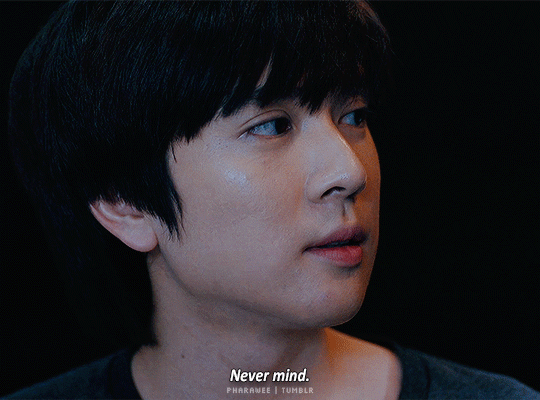

*หนู /nuː˩˩˦/
mouse; rat.
(figurative) young person; child.
used as a title or term of address
(colloquial, sometimes considered derogatory and offensive) used as a title for or term of address to a young or younger person.
(colloquial, humble) used by a person to refer to oneself when speaking to an older person or person of higher status.
#pit babe#pit babe the series#pon thanapon#sailub hemmawich#alanjeff#pitbabeedit#thai bl#thai drama#bl drama#bl series#my edits.#honestly i'm just melting every time alan calls jeff nu#(there's nothing derogatory about it in this case)#(even though jeff probably doesn't really like it that much right now lmao)#(it's just really cute and teasing and it's a pity the english translation doesn't offer a good equivalent)#i had to delete the linked source because it won't show up in the tags otherwise#the source is wiktionary
238 notes
·
View notes
Note
Do you think one could attain decent-ish ability to read Japanese just by studying kanji? Specifically asking because the kanji learnin' service "wanikani" is the single Japanese resource that works best with my brain, but then there are separate resources for grammar and vocab and and and.....
You will get REAAAALLLLLYYY far knowing only the kanji but you're going to have to know hiragana and katakana at some point too. Tofugu, the company that did Wanikani, has two mnemonics-based guides for the kana that are basically Wanikani Lite. They're how I learned the kana and I swear by them.
Here's hiragana: https://www.tofugu.com/japanese/learn-hiragana/
And katakana: https://www.tofugu.com/japanese/learn-katakana/
Hiragana are especially vital to learning kanji; you won't be able to use 99% of Japanese-English dictionaries without them. BUT they're pretty easy and the rules for using them are consistent. You won't have to remember any irregular exceptions for any of them.
I haven't tried it yet, but I've heard really good things about the Crystal Hunters manga series as a fun/low stress way to learning Japanese vocab and grammar. It eases the reader into new concepts and then repeats them throughout the chapter so you remember them. There are free vocab and study guides/lists for each chapter too. Might be worth checking out once you get some kanji and the kana under your belt? The first book is also free.
Official site: https://crystalhuntersmanga.com/
Good luck!!
#asks#Japanese takes like a bajillion hours forever to learn because of the 2200+ kanji lol...........#But it's sooooo consistent grammatically and with the spelling. I love it#Kinda spoiled me tbh. I look at English now and I'm like#'Why can't you be more like this. Why are you such a mess. Get your act together'#And then there's Korean's hangul writing system. It's SO BEAUTIFUL. Actual marvel of linguist engineering#The Japanese lexicon is also a lot smaller than English's too. Which is both a blessing and a curse#Less words = quicker to learn. BUUUUUTTTT less words that mesh well with English. Translation is hard!!!#Holy fuck. Ok so Wikipedia says that the English language has 755`865 words as recorded by Wiktionary#and Japanese has 500`000 according to Nihon Kokugo Daijiten#BUT THEN KOREAN. ACCORDING TO ONLINE DICTIONARY URIMALSAEM (open source dictionary) HAS 1`149`538 WORDS#The biggest lexicon is Tamil's with 1`516`952 unique headwords as recorded by online dictionary Sorkuvai#That's absolutely nuts#I got massively distracted. Enjoy my word vomit tags
37 notes
·
View notes
Text
Vocabulary - to want
A few different ways (that I know) to express wishes and desires.
eisiau - to want. One of the standard ways of saying you want something, all across Wales. In truth, it’s not actually a verbnoun like many others, it’s really a noun. That’s why you don’t need the ‘yn’ before it ad you would for any other verbnoun: ‘yn mynd’, ‘Dwi’n mynd’. ‘Dyn ni’n aros.’ Etc.
‘Dwi eisiau cysgu.’ I want to sleep.
I believe the reason for this is an older construction that is used in literary Welsh, but that got shortened and dropped off over time in colloquial Welsh. ‘bod ... ar [rhywun]’ was the construction used, roughly meaning to have ‘a want upon you’ (very roughly).
Double checking this with Wiktionary (beloved), they do have a credible literary source demonstrating this: the Welsh bible (which thanks to a frenzied linguistics and orthography-fuelled spiral down Wikipedia, and oddly enough, the Welsh comedian and radio broadcaster Elis James (unrelatedly), I know was first translated in the 1500s and directly led to the loss of the letter ‘k’ from the Welsh alphabet).
‘Yr Arglwydd yw fy Mugail; ni bydd eisiau arnaf.’ The Lord is my shepherd; I shall not want.
Close enough to colloquial Welsh to understand, that's using ‘eisiau arna (i)’. Over time, colloquial Welsh has dropped the ‘ar’. The example sentence above could've been 'Dwi eisiau cysgu [arna i]'.
A note. Some people have a misconception that eisiau should cause a soft mutation in the word following it, because it is an exceptional case of an action (of sorts) that doesn’t need an ‘yn’, and so must follow a pattern similar to a few other conjugations out there like ‘dylu’ (should).
‘Dylet ti ddweud rhywbeth’ (You should say something), ‘Galla i wneud rhywbeth amdano fe’ (I can do something about it), ‘Ga i rywbeth?’ (Can I have something?), the past tenses of gwneud, ‘wnaethon ni ddysgu Cymraeg’, ‘Mae rhaid iddyn nhw dduhino’n gynnar!’ (They just wake up early!)
And so on. This isn’t the case, as eisiau is not a conjugated verb. It’s just a noun for desire! (*not exactly. I’m trying to explain this as best I can)
There is a south Walian usage of ‘eisiau’ that makes this idea clearer.
In some southern dialects, the construction ‘mae eisiau i…’ is used to mean that someone needs something. E.g. ‘Mae eisiau i ti fwyta’ means ‘you need to eat’. What it literally means is ‘there is a need for you to eat’, and so you can see the noun eisiau (a need) in use.
North Walian Welsh uses the same structure, but with the noun angen instead. ‘Mae angen i ti fwyta.’ ‘Mae angen iddyn nhw sosban’, literally, ‘they are in need of a saucepan’.
Speaking of dialect differences, especially in north Wales Welsh, you might come across spelling variants of eisiau: ‘isio’, ‘isia’, (N) ‘isie’ (S), ‘isho’, etc. Perks of a phonetic language are that nothing’s a misspelling really if it sounds alright when said out loud. I did raise an eyebrow at the last one a little, ‘sh’ isn’t the English ‘sh’ in Welsh, is it? (Is that Wenglish?)
Other forms!
moyn - to want. Used pretty much only in the south and valleys, but this one is a regular verbnoun. ‘Dwi’n moyn cwpla fy ngwaith gytre’n fuan’ (I want to finish my homework soon)
(Just realised there are a Lot of dialect words in that sentence! Cwpla -> gorffen, gytre -> cartef)
It seems simpler than the exceptional eisiau construction, why isn’t it more widely accepted?, you ask. (Most people I’ve said it to say it immediately places you geographically to them because they never hear anyone else say it.) It derives from an older verb, ymofyn, which itself comes from the word gofyn (to ask), ‘ym’ + ‘gofyn’ = ‘ymofyn’, which sort of goes away from the original idea of wanting, and into one of asking. Still, language evolves, and so you will still hear moyn in South Wales. In fact, the Say Something In Welsh course teaches it (which is how I know it. Probably worth giving a disclaimer that I’m simply mad about linguistics and Welsh alternative bands, before anyone starts to think I live in Wales just because I occasionally write long grammar posts!)
Awydd - a desire. Used similarly to eisiau, no ‘yn’ precedes it. The whole point of making this post was that I just came across this sentence: ‘Ti’n awydd mynd i Gastell Caerfili?’ Meaning, do you want to go to Caerphilly Castle?
And those are the ones I know!
#vocabulary#sentences#source: online#source: dictionary#source: wiktionary#welsh#Dysgu Cymraeg#to want#language learning#I've done my homework this time so i am going to put it in the relevant tags. I'm fairly sure this is all correct#Cymraeg#learn Welsh#languages#linguistics#language stuff#etymology
11 notes
·
View notes
Text
artificial and official share -ficial which technically comes from the latin word for "make" but superficial's -ficial comes from the latin word for "face" (as in side/surface). i love etymology.
#whore's bible#this post is relatively pointless becuase i couldn't bother to add my sources#i have a screenshot of the source for official but im not taking two more screenshots of Wiktionary for this bullshit
10 notes
·
View notes
Text
The number 40 in Russian is so funny and annoying, let me fucking show you.
So let's go first from 1 to 10.
1 is odin, 2 is dva, 3 is tri, 4 is chetyre, 5 is pyat, 6 is shest, 7 is sem, 8 is vosem, 9 is devyat, 10 is desyat.
Now let's make them into decimals, alright?
20 is dva+tsat. 30 is tri+tsat.
We will return to 40 a bit later, just let me demonstrate the string, now we add 10 (desyat) to every number. 50 is pyat+desyat. 60 is shest+desyat. 70 is sem+desyat. 80 is vosem+desyat. EASY.
But 40? 40 is sorok.
What? That's a completely random word that does not look anything like chetyre or tsat or desyat.
Apparently, "sorok" used to mean "a pile of sable pelts", and it became so...widespread, that it actually replaced the normal way of saying 40, that would have been... yeah, chetyre+desyat.
So Slavs apparently just got so into trading sable pelts they just decided to refer to any 40 items as a pile of sable pelts.
I mean, imagine if a thousand years later from now, we call 4000 "cybertruck" in sentences like "there is more than cybertruck people living in town xyz" or "this dress cost me cybertruck euros". And an incredibly confused etymologist will write that apparently, there used to be a kind of thing named cybertruck and more than 4000 of them were recalled and everyone just began to associate these two just to be funny, and eventually cybertruck replaced an archaic way of saying it as four thousand . Or something.
#source: wiktionary lol dont ask#i love how u can also say it as forty hundred tho#u cant do that in russian for some reason
6 notes
·
View notes
Text
An analysis of official translations from JP into EN, KR, TW for two difficult to translate Siegfeld JHS Starira comics
as it says on the title, focusing on comparing and contrasting. long post, unsolicited term documentation, etc we have fun
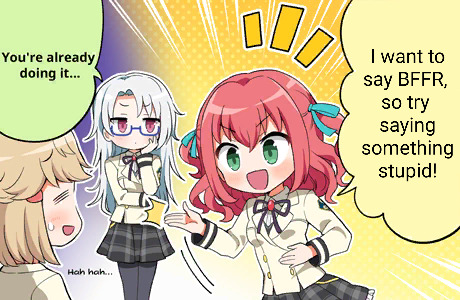
^ just me being silly
#1: Minku hanging from a horizontal bar saying something silly while Shiro watches

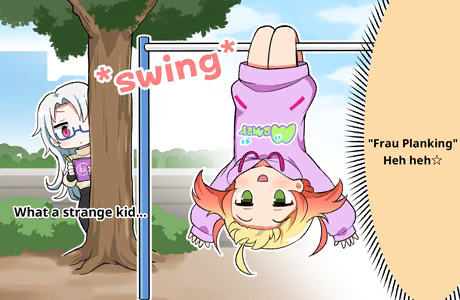
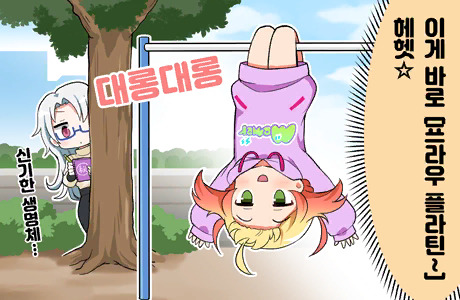

for comparison's sake tried to be as literal as i could. honestly the differences between the onomatopoeia for minku dangling and what adjective shiro uses are incredibly negligible, but i tried to exaggerate how the nuances feel to me. might be wrong. doesn't matter
JP
Shiro: A strange creature...
*dangle*
Minku: "Frau Pl-hanging around-tin"... Just kidding✩
the meat of the joke that makes it hard to translate is minku is going puraaaaan = onomatopoeia for dangling idly, and this gets put into Frau Platin (puratin) in the middle to make Frau Purāntin. doesn't work well for puns in other languages (i do love the tl by TsuNaMy_WaVe that says Frauplatin-side down don't think i could come up w something better)
EN
Shiro: What a strange kid...
*swing*
Minku: "Frau Planking" Heh heh✩
girl you are not planking but all the more power to you. redefine what it means to plank in 2022. I think someone on the en localization team was like "shiro can't call minku a creature bc someone might get offended" and like 😭 ok i guess but this is creacher erasure
KR
Shiro: A fascinating creature...
*dangle*
Minku: This right here is "Frau Platin~" Heheh✩
disappointed with this one they gave up on any sort of insertion. minku's barely even making a joke in this one so in some ways it makes her even stranger bc she's just saying things. you're frau platin bc you're hanging from a bar?
TW
Shiro: An unimaginable creature...
*sway~*
Minku: "Frau Horizontal Bar Platin"... Just making a joke✩
so the tw translation of "frau platin" puts the platin part first and frau part after: 白金皇君 bai jin huang jun = platinum emperor mr./sir/etc they put horizontal bar after the platinum and before the Emperor +title part so it's like. the emperor of platinum and ALSO the horizontal bar ?? 😭 funny way to reverse translate this translation while screwing it up even more would be "Frau Platin-um Bar" or something
#2: Stella failing at tsukkomi
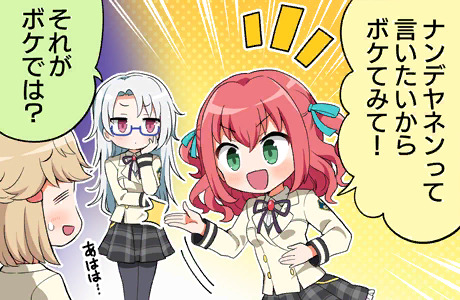



JP
Stella: I want to say "nandeyanen" (why the hell), so say something boke-like!
Shiro: Isn't saying that more boke-like?
Ryoko: Ahaha...
this joke is about stella not knowing much about manzai bc she's not from japan and wanting to be the tsukkomi sooo bad even though she's fundamentally NOT. not enough space to pack this info in a tl without confusing people who don't know anything about manzai—you would at least have to have some sort of t/n about What this is about like "Stella is trying Japanese manzai comedy" and i doubt they wanted to commit to that.
(alt bc i love to verbify:
Stella: I want to say "nandeyanen" (why the hell), so try boke-ing for me!
Shiro: Aren't you the one boke-ing by saying that?
Ryoko: Ahaha...)
EN
Stella: Try and say something stupid so that I can be surprised!
Shiro: You're already doing it...
Ryoko: Hah hah...
surprised ... perhaps not intentional but it really captures stella's innocence because WTF ARE YOU SAYING = surprised sure is a way to put it.
KR
Stella: I want to cut you off, so say something goofy!
Shiro: That's the goofiest thing one could say, though?
Ryoko: Ahaha...
first of all love how in this one shiro accuses her of saying the goofiest thing ever. second thing: rabbit hole time, sorry.
so what was used in place of "saying nandeyanen" is 딴죽 걸다 (ddanjuk geolda). the etymology is 딴 (ddan) from 다른 (dareun) meaning different, and 족 (jok, from 足) meaning foot which became 죽 (juk). 딴죽 (ddanjuk) is a move in ssireum and taekkyeon where one person kicks their opponent's calf and trips them so they fall.
from this, the phrase eventually came to generally mean interfering with something. in 1998, the online newspaper called 딴지일보 (Ddanzi Ilbo) was founded and through this website the term 딴지 (ddanji), which was a non-standard variant of ddanjuk, eventually became the more popular term. they were (and are sometimes still) used interchangeably, but afaik ddanji is way more common.
in 2014, ddanji was officially acknowledged as a standard term with a slightly different meaning from ddanjuk. when ddanji is used, it means to actively get in the way of something, and when ddanjuk is used, it means to do/say something different from what was originally planned (ie changing plans, backing out, breaking a promise).
however, it's still kind of used interchangeably and some people may still think that only ddanjuk is the "correct" term; on the namuwiki page for ddanjuk (where ddanji just gets a cursory mention) it says it is often used when translating "tsukkomi" (verb) from japanese, but i would argue that ddanji is probably the more accurate and common translation, at least now.
TW
Stella: I want to complain and say "what the hell~", so how about you play stupid for a sec!
Shiro: Aren't you already playing stupid?
Ryoko: Haha...
less intensive rabbit hole: "what the hell" in chinese here is 什么鬼 (shen me gui) which literally means what kind of [ghost/monster/etc=strange] is that?? it's originally from southern chinese dialect, where the standard versions would be 搞(的)什么鬼 (gao (de) shen me gui, what strange thing are you doing) or 什么鬼东西 (shen me gui dong xi, what strange thing is that).
a term used as a retort, it became very popular after being used in the online show Baozou Big News Events and is now widely used for expressing curiosity as well
by the way, Ddanzi Ilbo and Baozou Big News Events are both like, web content that do/did a lot of political/news satire isn't that such a funny coincidence? i'll conclude by saying my funy slang ver at the top is unfortunately too recent and too not political satire media influenced to hang out with those 2 but alas.
#revue starlight#siegfeld jhs#translation#idk lol . i think i'm learning that i need to get really into documenting shit on wiktionary instead of a pointless blog for myself#love cosplaying as a linguistics enthusiast all i do is google#sorry for lack of sources we ball you can google things too#stupid analysis
36 notes
·
View notes
Text
i wish i did not know the ache of love.
in my youth i heard rumours, stories, women driven to flame, men transforming into ice. but i still yearned for it. maybe it was because i wanted to be electrified by passion, maybe i wanted to be seen by the gaze of death. maybe i simply feared that a lack of love would hurt more than its presence.
that much is true, at least. for i have felt love, it has coursed through my veins and it burns. i nourish the emptiness inside my soul every day he is gone. there is a cavity in my heart, one only he could fill, so it shall remain hollow. but without that pain, he would become a mere memory, diluting into nothing more than air and bones. food for the vultures.
even then, i wish i did not need to know the ache of love.
михаиле, мій лю́бий, поверта́йся, до мені́. пий мої́ сльо́зи, коли́ бу́ду пи́ти ва́ші, і трима́й ме̏не в ва́ших рука́х, коли́ бу́ду трима́ти тебе́ в мої́х. якось, бу́демо спокі́йний ра́зом
#rtc#ride the cyclone#talia rtc#mischa bachinski#talischa rtc#rtc rp#the ukrainian is: 'mischa my darling come back to me. drink my tears as i will drink yours and hold me in your arms as i will hold you in#mine. one day we will be peaceful together'#okay so i used wiktionary and google translate for the ukrainian as well as trying to use other resources#i don't have the best grasp on how ukrainian sentences should be structured either so please let me know if i've made an error!!#i had to use a russian source for the cyrillic version of mischa's name#but all those letters are in both alphabets so i assumed it would be fine#and i added the -e for the vocative#but i didn't do that for 'my darling' bc wiktionary told me i didn't need to#also#can i just mention the audacity of google translate#because when i typed in 'my darling' it gave me the feminine version of the word#rather than fem and masc options (bc gendered language)#fortunately wiktionary clarified#but like#we as a society should be able to call men by sweet dramatic names fuck you#i really give talia a lot of imperatives huh#it's okay i love that for her#and then 'my tears' are accusative but ukrainian has both animate and inanimate accusatives which i personally am not familiar with#so i went with inanimate accusative 'my' because i didn't put a participle#i should really just learn ukrainian on fucking duolingo shouldn't i#for 'hold me in your arms' i used the locative bc of *in*#i've studied latin (why i use wiktionary) which has just the ablative rather than separated into loc. and instrumental#for hold i used the ukrainian wiktionary#but it was unclear as to whether a) it was russian or ukrainian and b) if i used the first person future or the infinitive
13 notes
·
View notes
Text
As I was refreshing my knowlegde on the etymology of the word "women" I saw Wiktionary had an entry for "women ☕"


#women ☕#woman ☕#wiktionary#wiktionary shitentry#etymology#backformation is one of my favourite lexical sources
0 notes
Photo
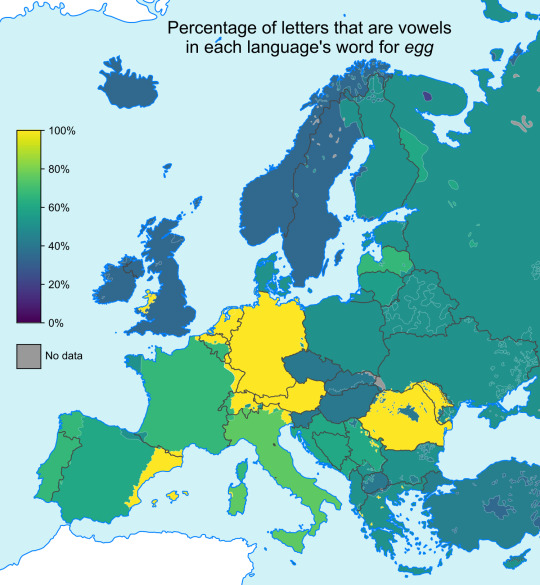
Percentage of letters that are vowels in each language's word for "egg".
by 99685-96-8
To preface: I am not a linguist, so there's a high probability there are some mistakes in this map. Please don't vilify me if I misrepresented your language in this map.
Edit: Friulian should be 50%, not 100%. Updated map.
Here's a version of the map with language labels.
Here's a version of the map with percentage labels.
This map mostly stemmed from a stupid thought in my head, when I realized the Dutch word (I am Dutch) for egg (ei) only consists of vowels. This sparked the question of how this property is distributed across European languages.
One search for a language map later (thanks Wikipedia!) and dozens of searches for translations and alphabets later (there are approximately 60 languages on this map) (thanks Wikipedia and also Wiktionary!) and now we know!
(As "vowel," I defined a letter that can have a vowel sound in the corresponding language. For many languages, it was hard to find pronunciation guides for the specific word while finding a translation was easier, so I decided to focus on letters instead of phonemes. Furthermore, for some languages in the base map, I could not find a trustworthy translation, hence the "no data" for some languages. Digraphs in some Cyrillic alphabets were counted as a single letter.)
Happy Easter!
Main sources:
Base map from Wikimedia Commons
Most translations from Wiktionary
Ladin translation from the Istituto Cultural Ladin
Sámi translations from the Oahpa portal of the University of Tromsø
Scots translation from scots-online.org
492 notes
·
View notes
Text
"Top", "Bottom" Discussion in Unknown ep. 12
The Office Gossip Scene
[Edited on 10th May; changes under clarification headings]
Now that the Unknown has resurrected the conversation about gong shou, let’s talk about it. The what and the why, so to say.
Thank you @1serotonindeficientgirl (whose post inspired mine).
I welcome critiques and corrections. So, please feel free to do so.
Scenes and subtitles

The discussion in the episode starts with Wei Qian’s staff gossiping about his relationship with Wei ZhiYuan. One of the staff members comments that Wei Qian is like a little lamb (小绵羊) when it comes to his little brother:
只要遇到他弟弟
就像小绵羊
Someone replies with the following idiom:
羊入虎口
(Literally: “a sheep enters a tiger's mouth”)
It means to enter a dangerous situation where one will certainly suffer [Source: Wiktionary].
The female employee (who witnessed their kiss) asks San Pang:
三胖哥谁是羊谁是虎啊 - Who is the lamb (羊; sheep) and who is the tiger (虎)?
This has some employees confused and they ask for an explanation. They receive the following reply:
就是攻跟受的差别啊 – [it means] between them, who is gong and who is shou?
One of the staff members repeats the unfamiliar terms:
攻受 – gong shou
and the fu-nu (腐女; fujoshi) offers an explanation:
好啦姊姊教你们 – let this elder sis explain
老虎看到羊会 – the tiger upon seeing the lamb…
Before she can complete her explanation, Wei Qian moves into the scene accompanied by the growl of a big cat. The gossipers disband.
In the end our fu-nu expresses their support for Wei Qian’s relationship with Wei ZhiYuan. Before she runs off, she throws him the question:
你们谁是攻谁是受啦 – between the two of you, who is gong and who is shou?
In the next shot Wei Qian is alone. He flexes his muscles and comments:
很明���吧 - It's obvious, isn't it?
[END OF SCENE]
Everyone at that office seems pretty close. The staff calls Wei “Qian ge” 谦哥 (first name + brother) and not as “Mr. Wei” (as the English subtitles suggests). Looks like Lao Xiong (emphasis on Lao = old) is the only one who clearly disapproves of such gossipmongering.
Notice how the terms gong and shou were translated directly into top and bottom in English subtitles. While that’s technically correct, there’s some nuance missing.
While there are tongzhi (同志;queer) people who use the terms gong and shou, these are not the most popular terms for top and bottom in the tongzhi community. This series specifically uses the terms gong (攻) and shou (受). Why? We’ll get to that in a minute.
In a BL, being shou means that character is the bottom in that particular ship. That character could be top, bottom, versatile or neither in another ship. A character is a bottom (as we use the term in English) only when that character is an absolute shou (sou uke in Japanese). An absolute shou is invariably shou. No matter which ship he becomes part of and no matter who he is paired with, he will be the shou. Similar difference exists between the terms “top” and “gong”.
English subtitles use ‘top’ and ‘bottom’ from the get-go. There is no need to explain what those terms mean. But that’s not the case with gong shou – only 腐 (fu) people (BL fans) really knows what those terms really mean and thus warrants explanation.
Clarification
[Edited. Thank you @abstractelysium and @wen-kexing-apologist for contributing to the conversation.]
As noted in the convo, Wei Qian is pretty ferocious in the office and is only gentle when it comes to Wei ZhiYuan. So, it is normal that gossiping irrespective of topic would end as soon as he arrives. Also, I think Wei Qian didn’t get what gong shou means other than allusion to tiger and lamb. The original language dialogues don’t make it clear that gong and shou means top and bottom (in a ship). [The English subs gives off that impression since gong and shou were simply translated.] Moreover, those terms are danmei literacies that has entered dictionaries but not necessarily public knowledge.
It is like an insider joke for fu-people made possible by Wei Qian’s ignorance. That wouldn’t have worked on Wei ZhiYuan who read danmei while growing up. That wouldn’t have worked if the fu nu (fujoshi) stuck around to explain what that means.
Usually in such conversations in BL, fu-people are shown to be mistaken: they either mess up the ship/dynamic (Love By Chance 1) or the character(s) in the ship deliberately trick them (Counter Attack). It is almost always played out with seme/gong’s approval in BL - not sure if that dynamic between fu-people & seme aka gong character ever appeared in any live-action dynamic. The trigger of this scene is Wei ZhiYuan’s deliberate choice of actions: PDA, kiss in the office right in front of a staff member.
BL literacies
BL is a media genre in itself with different sub-genres, genre conventions and classic works. It sure has a lot of overlap with other genres:
Romance as well as GL – they coevolved. They share mothers and other ancestors.
Queer – Is it really a genre? Even if one were to ignore queer as method in academia, it is still so complex.
Let me quote Taiwanese tongzhi author Chiang-Sheng Kuo:
… what exactly is queer literature? Is it queer literature if queer people like to read it, or is it only queer literature if there are queer characters in the books? Or is it an appendage of the queer movement? If a queer author writes a book without queer characters, does that represent a certain aspect of queer culture?
(You can find the whole interview here.)
Just as danmei (耽美; Chinese BL) has its roots in Japanese BL, so is gong (攻) and shou (受) from seme (攻め) uke (受け).
gong shou aka seme uke dynamics
Mother of BL, Mori Mari, didn’t come up with it, nor did her father Mori Ogai. Both she and her father, among the other dozen tanbi (耽美; same writing as danmei but different readings cause different languages, and different meanings cause different cultures) authors inherited it from authors before them who wrote on contemporaneous and historic Japanese male androphilia.
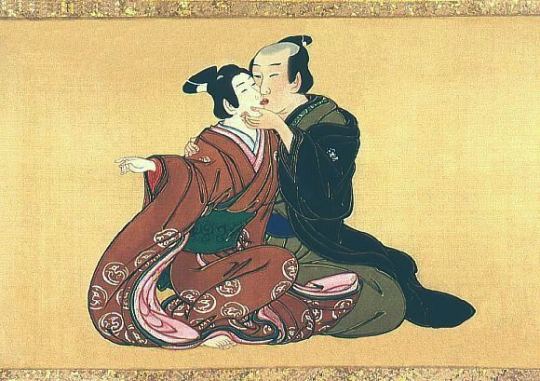
Spring Pastimes. Miyagawa Isshō, c. 1750 | seme uke dynamics in nanshoku pre-dates BL by hundreds of years.
While there is no dearth of riba (versatile) characters in BL, seme uke dynamics is:
a genre specialty. There are similar words in use in GL as well.
an enduring connection to the past of where BL was born.
remnants of a particular model of queerness; an alternative to LGBTQIA+ form of queerness.
What’s there in the scene
There is something hidden in the euphemistic explanation. On the face of it tiger devouring a lamb would be allusion to tiger gong devouring (topping) lamb shou.
But then tiger is a big cat and lamb is a herbivore. Neko (ネコ), the Japanese queer term for “bottom” means cat (etymology is obscure with this one). The term herbivore (草食) when used to describe a man means that man is masculine in a non-hegemonic way. In the series, Wei Qian embodies the hegemonic masculinity while Wei ZhiYuan is a quintessential grass-eater.
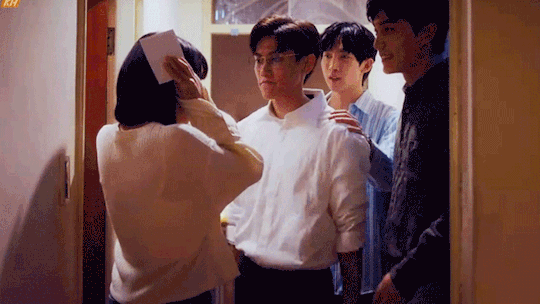
So, the description of lamb being devoured by a tiger would not be associated as simply as with the terms gong and shou especially when it comes from Taiwan which has been historically more connected to Japanese BL than any other BL producers (Sinophone or otherwise).
This connection was highlighted during 魏之远 Wei ZhiYuan's naming scene where Le Ge used the borrowed Japanese possessive particle (の; no).
の = 之 (zhī)
The big cat sound effect for Wei Qian in particular adds to this. Wei Qian’s character is best described as a queen shou.
女王受 Queen shou: A shou who is as proud as a queen, and would devour gong. (source)
Wei Qian and Wei ZhiYuan’s ship is best described by Priest (the author of Da Ge, source novel of Unknown):
经典款毒舌女王和屁颠屁颠的忠犬组合 – paring of a classic, sharp-tongued queen and a tail-wagging loyal dog.
BL literacies & Affective learning
BL kind of has its own language (with words like gong shou), which fans use to share ideas and feelings. This secret language is what academics call ‘literacies.’ BL fans are all in on this and have their own ‘ways of behaving, interacting, valuing, thinking, believing, speaking, and often reading and writing’. Through ‘various visual, conceptual and textual literacies’, BL fans weave ‘an intertextual database of narrative and visual tropes which readers draw upon to interpret BL’. BL literacies is learnt through ‘affective hermeneutics – a set way of gaining knowledge through feelings.’ Audience learn BL literacies from BL works ‘which eventually leads to their active engagement’ with other BL fans. (source; Kristine Michelle L. Santos explains it in the context of Japanese BL but it applies to all BL media irrespective of where it is from.)
That scene in Unknown was set up to familiarize audience with BL literacies – not only those specific words but also the larger practice of imagining character pairing and indulging in that imagination. This is evident from the overall jubilant tone of the scene and the camera work. It is a celebration of moe. That is why we have a character who is not only a fu-nu but also willing to be openly fu-nu in that setting, sharing BL literacies and her colleagues interested to learn.
For other examples, check out Thomas Baudinette’s book Boys Love Media in Thailand: Celebrity, Fans, and Transnational Asian Queer Popular Culture. He has a chapter dedicated to explaining how genre conventions were taught to the early audience of Thai BL through similar scenes.

Why must they do this? Why break the fourth wall like this? To get more people interested in the intricacies of BL and to get them to participate in the culture. BL is created by fu-people and BL literacies are their tools and source of joy. BL must draw in more people to keep BL culture going. Commercialized BL we have today is the result of an affective culture formed over the years. It is built on years of labor of authors and their audience. I mean, look at the Unknown. This BL employs the well-developed Loyal Dog gong x Queen shou dynamics. Apart from that which the series took from the novel, it also drew upon other common BL beats to tease the relationship between Dr. Lin and his senior.
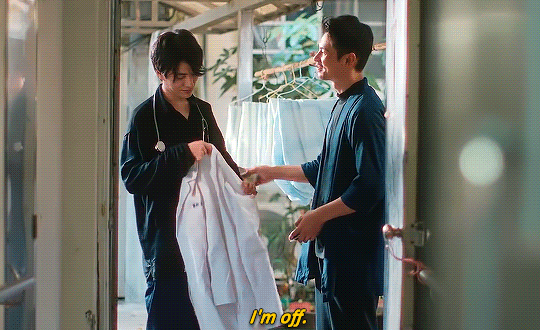
Teaching BL literacies is political. When Mainland Chinese government gets dangai productions to change names and relationships of characters (among other things), it is to prevent live-action audience from discovering BL as a genre with it disruptive potential. It is not only character's names and relationships that are changed. There are entire sub-genres of danmei (such as 高干) that got wiped out by censorship.
When a Taiwanese BL not only retains the character names & relationships and shows relatively explicit intimate scenes but also actively promotes BL literacies, it is an act of resistance. Discussion of gong shou, being genre specialty, manages to do so. Interestingly, they are doing it in an adaptation of a novel by Priest who has a particular reputation with self-censorship. That scene is not part of the source novel.
Heterosexual & gong shou
Association of bottom with the feminine (female or otherwise) has its roots in medicalization (and pathologization) of homosexuality in the west (such as through theories by scientists and doctors like Richard von Krafft-Ebing). This “knowledge” subsequently spread across the globe and was adopted to varying degrees and forms.
Moreover, the terms gong and shou applies to heterosexual pairing too.
BG (boy girl) ships have male gong and female shou
GB (girl boy) ships have female gong and male shou. [If this is interesting unfamiliar territory, check out the series Dong Lan Xue (2023).]

Moreover, if one is willing to look beyond LGBTQIA+ form of queerness (which is born and brought up in America), one can see other queer possibilities. For example, Kothi-Panthi queerness in South Asia which is characterized by explicit presentation of top bottom dynamics. There are very many similar forms of queerness in other parts of Global South.
In many cultures, sexuality doesn’t inform identity but sexual preference does. That’s why is you are to ask a kothi-panthi couple which one of you is the bottom, the kothi would tell you without hesitation: “I am.” Might even asked you in turn, “Couldn’t you tell?” For them, sexual preference (being kothi) rather than sexual orientation takes center stage. This is the inverse of how LGBTQIA+ form of queerness looks at it. While LGBTQIA+ model of queerness focuses on sexual orientation (being pan, ace, gay, etc.) as something that can be freely discussed but sexual preference (top, bottom, versatile, side, etc.) is considered private.
*Just to be clear, “kothi” is a term of self-identification. It means that the person is a bottom. Panthi is not self-identification. That’s how kothi address the men who top them.
While thanks to westernization LGBTQIA+ form of queerness enjoys more visibility, I think it is better to consider it as one type of queerness rather than the only model of queerness. Gong shou dynamics doesn’t fit into LGBTQIA+ form of queerness because it comes from another, much-older nanshoku model of queerness that made its way into Japan from China, hundreds of years ago.
Friction between different models of queerness is common where ever they interact. In 1970s, Japan was witness to public debates between a younger, westernized Japanese queer activist Itō Satoru and other Japanese queer activists such as Fushimi Noriaki and Tōgō Ken who were rooted in indigenous tradition of male-male sexuality.
[Itō Satoru’s] insistence on the necessity of adopting western models of gay identity and coming out have brought him into conflict with other activists such as Fushimi Noriaki and veteran campaigner Tōgō Ken.
Interpretation and Orientalism: Outing Japan's Sexual Minorities to the English-Speaking World by Mark McLelland
Clarification
[Edited. Thank you @wen-kexing-apologist for contributing to the conversation.]
Under the LGBTQ+ model of queerness, it maybe considered inappropriate to have conversation about “top” “bottom”, especially in the office, going as far as to ask that to Qian ge. From that perspective, the BL audience (especially those who are unfamiliar with the terms gong and shou) are fair in their assessment of that scene being out of place or outright offensive.
I think things might have been a bit different if the subtitles retained the terms gong shou instead of “top” “bottom” since they aren’t exactly the same thing. That would have had the desired effect (of introducing BL literacies - gong shou in the context of 强强 (strong gong x strong shou) pairing) without unintended consequence.
What is considered rude under the LGBTQ+ framework is an essential part of fu culture. It is like addressing Wei Qian as just Qian – that could be considered rude in the original language but pretty normal in English. Different cultures, different norms, so to speak. It is only polite to be mindful of the cultural differences and avoid discussing about sexual preference where it is considered inappropriate.
As for the normalization of fu culture (especially discussions of gong shou), in my opinion the didactic scope of Unknown is undermined by the very fact that it is primarily a gǔkē danmei (via adoption (收养)) with tongyangxi vibes (highlighted multiple times by San Pang in the novel) associated with Wei ZhiYuan.
Somehow fu-culture gets judged by those who consume products of that culture. Everyone is happy with fu-cultural products as long as fu-people don't discuss who is gong and who is shou.
Why are fu-culture and BL always judged based on a culturally alien lgbtq+ form of queerness? Why must BL be arm-twisted to fit into norms of lgbtq+ form of queerness just because that is the most mainstream form of queerness?
-
That’s not much a conclusion but this is already so long. I really hope it gives you something to think about.
If you are interested, here's more.
#boys love#danmei#taiwanese bl#bl meta#bl history#bl analysis#unknown the series#unknown the series analysis#unknown the series meta#unknown#priest novels#unknown bl#unknown series#unknown the series spoilers#taiwanese series#taiwanese drama#chinese bl#chinese queer culture#danmei tropes#danmei novels#bl tropes#bl trivia#bl taiwan#unknown bl meta#unknown bl analysis#bl critique#bl novel#bl drama#yuan x qian#zhiyuan x qian
151 notes
·
View notes
Text
I discovered something interesting about the nickname "pet"
After a bit of research, I just realized an extremely clever detail about Nevermore.
After their encounter in the greenhouse, it's pretty clear to us readers that the two of them are going to have problems at some point (according to those with access to the fast-pass chapters, we're already entering a divorce arc) for a pretty simple reason: Annabel wants to save them both, Lenore wants to save everyone. This leads to a moral conflict (because Annabel would sacrifice anyone to keep Lenore safe, which Lenore is not amused about) and puts Lenore in the awkward position of making leaps of faith to trust Annabel, even when her actions are quite shady on purpose.

All of this conflict is encapsulated in an extremely small detail: the nickname "pet."
According to the Wiktionary (yes, an unreliable source, but it has the references), there are records of this word dating back to the 16th century, where it was used as "indulged child". Although its origins are unknown, it is believed to be a back-formation of "petty, pety", meaning "little, small".
It is thought to be comparable to "peat", which in Old British English is comparable to "darling" (which makes a lot of sense given this first encounter), and in a second etymology also to "a favorite".
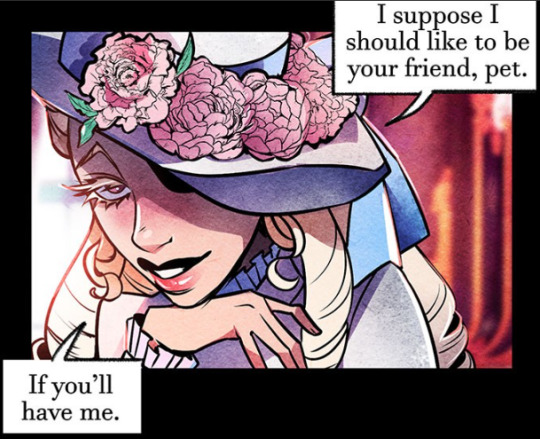
In other words, Annabel is using this pet name as a condensation of "my little girl," "my darling," "my spoiled child," and "my favorite," all at the same time. And if this person is correct, she also calls her "my petal”.
But these scenes suggest that Lenore actually thinks Annabel is referring to her as a companion animal, and rather than clear up what seems like an obvious misunderstanding, Annabel prefers to keep it in the shadows because she finds it more fun that way.
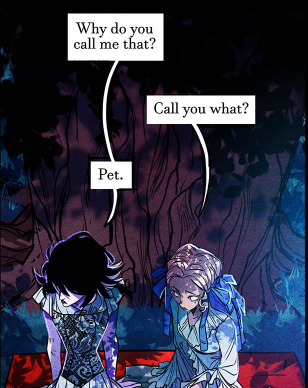
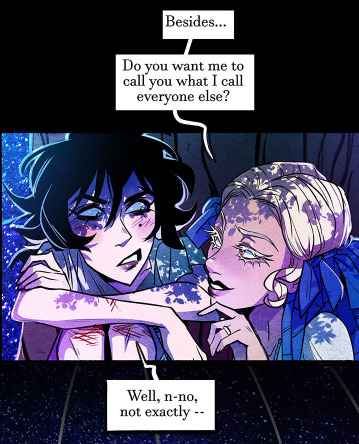
In short, the comic is telling you that a big problem between them is that Annabel is hiding important details and just expects Lenore to go along with it. Considering that Lenore doesn't complain again, she's willing to trust that the nickname is affectionate and not malicious, but it's clear that this is not a situation that can be maintained forever (not if you want a relationship that works, of course).
And I don't know about you, but I find it really fascinating that this story gives you SO much information with a damn pet name.
#nevermore webtoon#comic#white raven#annabel lee nevermore#lenore nevermore#lenore vandernacht#annabel lee whitlock#annabel lee x lenore
704 notes
·
View notes
Text



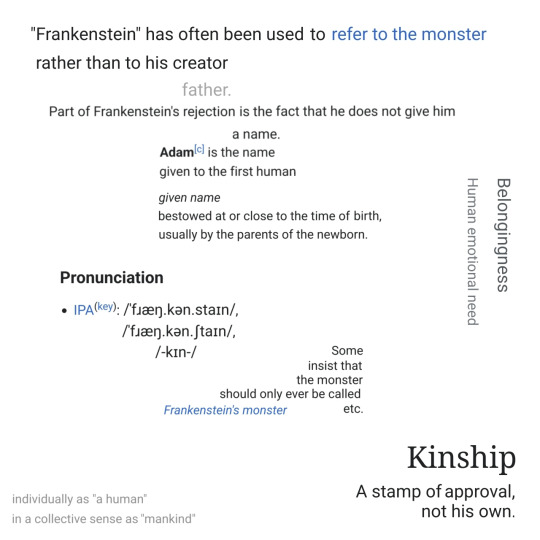
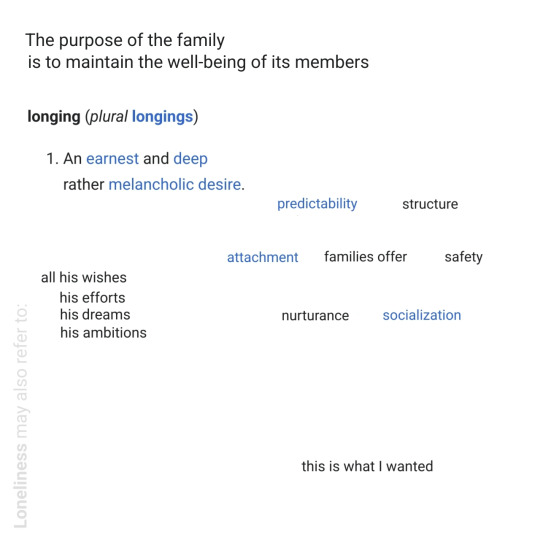
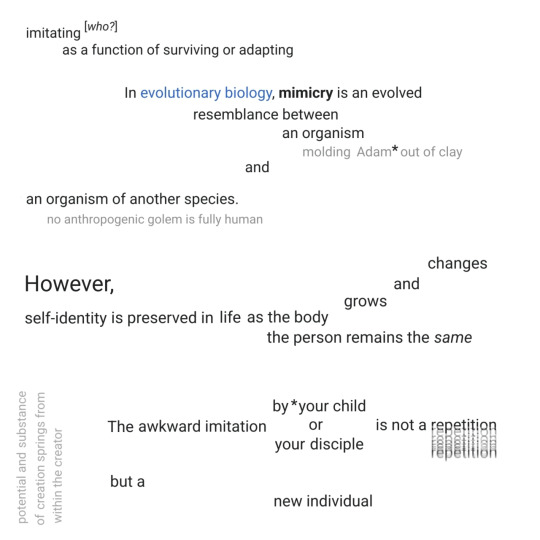
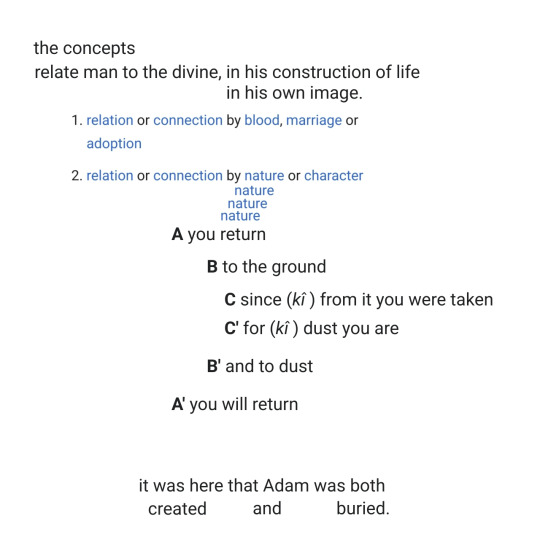
Sources: Wiktionary (Creation), Wikipedia (Creationism), Wikipedia (Adam), Wikipedia (Golem), Wikipedia (Homunculus), Wikipedia (Frankenstein), Wiktionary (Human), Wiktionary (Anatomy), Wikipedia (Citation Needed), Wiktionary (Frankenstein), Wikipedia (Kinship), Wikipedia (Belongingness), Wikipedia (Family), Wiktionary (Longing), Wikiquote (Imitation), Wikipedia (Template - Who?), Wikipedia (Asterisk), Wikipedia (Loneliness - Disambiguation), Wikipedia (Mimicry), Wikipedia (Personal Identity), Wiktionary (Kinship)
#my webs#ummm. um. 😁👍 so guess who's normal and having such a fun time!!!!#<- voice of a guy who totally wasn't changed by reading Frankenstein. um#yeah!#web weaving#webweaving#i heart wikipedia. fixated on finishing this for like 2 hours last night which is regular behaviour i am sure#long post#anyways :] sniles#tried to cite my sources!! i love house of leaves (points at the formatting
227 notes
·
View notes
Text
The difference between ‘byth’ and ‘erioed’ (Y gwahaniaeth rhwng ‘byth’ ac ‘erioed’)
Both mean ever/never, 'ever' in a question, never in negatives, replacing ‘ddim’ where it would occur in such a sentence. But they differ in which tense each can be used.
erioed/byth -> ever/never (adverb)
byth bythoedd/yn oes oesoedd -> for ever and ever (just an idiomatic phrase)
“Dwi ddim yn meddwl amdano fe.” I don't think about it.
Alternatively, you could use ddim, and then tack on byth/erioed at the end of the sentence.
Tenses and usage (Amserau a defnydd)
Erioed is used in “completed tenses in the past”, the present perfect, simple past and pluperfect (past perfect) tenses, replacing ddim in the negative.
“Dwi erioed wedi meddwl amdano fe.” I have never thought about it.
“Dwi ddim wedi meddwl amdano fe erioed.” [Present perfect]
“Wnes i erioed feddwl amdano fe.” I never thought about it.
“Wnes i ddim meddwl amdano fe erioed.” [Simple past]
*Note: Eriod, unlike ddim, does not prevent the soft mutation from occurring. “Wnes i ddim meddwl”, ond “wnes i erioed feddwl”.
“Do'n i erioed wedi meddwl amdano fe.” I had never thought about it. [Past perfect]
Byth is used with all other tenses: present, future, imperfect (past continuous), conditional.
“Dwi byth yn meddwl amdano fe.” I never think about it. [Simple present]
“Fydda i byth yn meddwl amdano fe!” I will never think about it! [Future]
“Do'n i byth yn meddwl amdano fe.” I was never thinking/never used to think about it. [Imperfect]
“Faswn i/fyddwn i byth yn meddwl amdano fe.” I would never think about it. [Conditional]
Erioed is an interesting word in its etymology, Wiktionary (fy ffrind gorau yn y byd, yn wir) says it comes from er (like ers, meaning since) + ei (3rd person singular basically) + oed (time, age). Literally ‘never’ = ‘since their time’.
If you've never had ice-cream, ti erioed wedi cael hufen-iâ, you've never had ice cream since your time (on earth, presumably), though why you wouldn't have ice cream ever is beyond me. Dwi'n mynd i fwyta hufen iâ nawr, in fact. Fel trît :)
(On the other hand, byth shares a root with the word ‘byd’, meaning ‘world’ but also used in the negative sense with dim to mean nothing: dim byd. Maybe it's the way French uses the word 'monde' meaning world, where ‘tout le monde’, literally the whole world, just means ‘everyone’ (dramatic much!), but I am just thinking out here.
I think about it because it makes it easier to remember the Welsh structure when I've seen these structures before elsewhere, helps me get comfortable with them far quicker than if I were starting from scratch, but also because these sort of structures where you use two words to form a negative, and the word that actually carries the negative notion gets dropped in favour of the word that sticks out to us the most, which may even carry the positive notion, has been around for a while in a few languages!
English had a similar thing way back when (the reason this is under a Keep Reading is because it's 2 AM and so I might be getting stuff wrong here, but I think the 'way back when' in question was Middle English. Don't want to feed anyone lies though! I'll double check that with a history of English/linguistics textbook later), when the structure for an English negative was "[subject] ne [conjugated verb] not". ‘I ne saye not’ was how you'd say that you don't say. The ‘ne’ dropped off in time, and over time ‘do’ joined the ‘not’ and moved to the front giving us ‘I do not say, and ‘not’ is sufficient to convey negation.
French currently has the Middle English structure: ‘Je ne dis pas.’ In colloquial French, you do see the 'ne' dropping off too, 'je dis pas' is understood to mean the same and pas in itself is sufficient to convey negation.
In Welsh, ‘dim byd’ means nothing, but ‘dim’ initially just meant ‘a thing’ in Old Welsh, and ‘dim byd’ was closer to ‘anything’ than ‘nothing’ (Wiktionary implies it might've come from something along the lines of “a thing of the world”, whereas it now seen as “nothing (of) the world”) , and there was an old word at the beginning of the sentence to convey the negation when it was used in this way to mean nothing.
(A word which, because it is 2 AM I cannot for the life of me be sure of getting right. But similar to how other negative verbs like 'dwyt/dydy/dyw', 'does' etc. came to acquire their 'd's from the negative word 'nid' that would go before them, while 'wyt/ydy/yw/oes' retained their usual non-negative notions, dim had something too, but I can't remember.
“Nid oes dim byd yma” literally just meant “there isn't (nid -> not) anything here”, and that just became “Does dim byd yma”.)
Some digging around tells me that this is called ‘semantic bleaching’.
Anyway, what was all this about? Byth, it comes from the Old Irish word meaning world. And that's that! (...along with potential mistakes)
#grammar#vocabulary#dysgu cymraeg#learn welsh#sentences#source: duolingo#source: wiktionary#byth#erioed#adverbs#welsh#cymraeg#langblr#language learning#just read a comprehensive breakdown of it on Duolingo and Wiktionary and wanted to write it down somewhere before it stopped making sense t#me. Figured I may as well post it publicly since I'd written it all!#idiomatic expressions
19 notes
·
View notes
Text
yo, found out wiktionary.org is great for finding declensions for Czech nouns, at least a large portion of common nouns. I’m very much a beginner, but the declensions that I’ve been able to verify are correct (including ones like kočka that has a stem change). If anyone has a better source, I’d love to hear it, but wiktionary is seeming like a good start
46 notes
·
View notes
Text
Gideon the Ninth audiobook, through to the end of Chapter 31
Cytherea is described as having "biscuit-colored curls" which I kind passed over the first time I was reading. She's described elsewhere as having light brown hair; American biscuits aren't any kind of brown, if they're made right, but Muir isn't American, either. In Britain, it's my understanding that "biscuit" refers to any hard flat cookie with a stamped design, but those come in all sorts of colors. Does "biscuit" mean a secret third thing in New Zealand?
Gideon says "it's stupid for a cavalier to watch their necromancer die" which I think sort of foreshadows Gideon rejecting Harrow's instruction to survive her
Gideon asks Cytherea why she came to Canaan House in the first place, and I feel like Cytherea's answer is about when she came the first time, nearly 10,000 years ago? She talks about how the Seventh wanted her to die beautifully and she though the Emperor had her best interests more at heart than they did
She says: "If they could figure out how to stop you when you're mostly cancer and just a little bit woman, they would" about the Seventh, but that's exactly what John did to her, isn't it?
And then: "I'll probably live forever, worse luck, whatever happened to One Flesh, One End?"
Palamedes pronounces "golem" exactly like "Gollum" and that amuses me
Harrow thought the secret to Lyctorhood was a secret power source in Canaan House they were supposed to discover - I guess to the extent that the consumed cavalier's soul is a power source, she wasn't exactly wrong
Camilla: "The last thing the Warden needs is an introduction to Lady Septimus" - pretty funny in retrospect
Palamedes after Harrow removes the plug Cytherea put on the Seventh lab's keyhole: "Did you hide the last key, too?" He was right about that
Colum is described as having a "perpetually scratchy voice" which I missed the first time, but it does match up with his voice here
Mayonnaise Uncle thinks Gideon's red hair might have come from the Third, which is I guess some extra information about the distribution of phenotypes in the Empire, but the only other redheaded House character we know of is G1deon (I almost wrote "Pyrrha") (who, ironically, is not biologically related to Gideon Nav unless he was like John's cousin or something). Mercy had "pink" hair, but I don't know if that means like, strawberry blond, or like, literally dyed pink. I guess it's been 10,000 years, so things might be a bit different now
Colum: "The next time we meet, I think it's likely one of us will die." Well, it wasn't the next time they met, since they both showed up to hear Cytherea tell a very fake story about why Protesilaus was already dead just after this, but I think it's the next time they are both in the same room together than Colum dies, so, yeah
Teacher says something about a "poor child" and Gideon doesn't know who he's referring to and I don't either even on the second readthrough. I guess it's possible that he's just talking nonsense, because he's a weird construct, but he's been saying things that consistently make sense in the current context throughout the whole book, so I don't really buy that
The scene where Corona is practicing with a sword and challenging Gideon to a duel feels kind of like she's anticipating being left behind by Ianthe and is trying to lean into the idea of becoming a cavalier after this, since she can't pretend to be a necromancer without Ianthe. We know from the Fourth teens that Ianthe has been sneaking into all the locked doors and reading the theorems at this point
When Naberius comes to collect her, he says "I won't tell her". I guess he means Ianthe?
Is that really how "beatified" is pronounced? I don't think I've ever heard it spoken before. Wiktionary seems to agree that it is
If I had listened to the audiobook first, I definitely would have misheard Gideon talking about "narking" on Harrow as "knocking" and been confused
Palamedes: "All I ask is that you put some pen and flimsy in my cell so I can start my memoirs." Yeah, that's not what you wrote when you were actually confined to the River bubble for months, haha
Narration: Suddenly [Cytherea] seemed impossibly old.
Cytherea claims that John was against soul siphoning. So, the thalergy siphoning that was a fundamental part of Mercy's challenge, and which the Second House uses regularly on enemies, is totally fine and cool, but Mayonnaise Uncle send Colum's soul away temporarily to generate power is wrong. You know, Mayonnaise Uncle is actually a lot more sympathetic on the second readthrough
Mayonnaise Uncle also really had Cytherea's number in this scene and no one listened to him, he was the only one saying that Cytherea was suspicious and everyone else was disgusted by this, including Judith. No wonder he was so sour in Harrow's River bubble
Harrow wants to use Protesilaus' head for necromancy and everyone else is unhappy about this. But this isn't strange for the Nine Houses - the Canaan House skeletons were made from the dead just like the Ninth skeletons were, and just like the Sixth skeletons were in Dr. Sex, not to mention Ianthe's use of Babs' body. Like, if we are going to start complaining about the desecration of dead bodies now, I think that starts to call into question the entire way that the Nine Houses uses necromancy and has been using it for the past 10,000 years. I'm not sure any of the other necromancers really have that high ground
Palamedes says Cytherea only has days left to live, she definitely giggles at that
In the pool scene, Harrow says that the calculations for the deaths of the 200 children were very precise, and that the babies contributed the most thanergy. Now I'm wondering if Gideon failing to die might have messed up those careful calculations in some way? Obviously Harrow was still born a powerful necromancer, and it still worked overall, but now I'm curious
Harrow about John's blood ward: "I knew it had to open for me" because she was the descendant of Anastasia. She never questioned that there might have been some other reason it opened
21 notes
·
View notes
Text


It's not uncommon to see wikipedia articles or wiktionary entries that contradict each other somewhat. It's a bit more unusual to see it happening within a single article.
The number in the header paragraph cites a book published in 2011, which is likely too close to 2012-13 for the difference to be explainable by population change.
I don't consider the two populations in the infobox contradictory as the second is dated to 2020.
Source:
45 notes
·
View notes